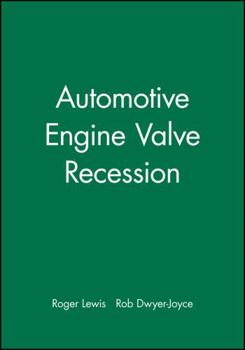Automotive Engine Valve Recession
An "Engineering Research Series" title. Valve wear and its effect upon engine performance still presents a major challenge to the tribologist. Although new valve materials and production techniques are constantly being developed, these advances have been outpaced by demands for increased engine performance. The drive for reduced oil consumption and exhaust emissions, use of lead-replacement and low-sulphur fuels, and the introduction of alternative fuels such as gas all have implications for valve and seat insert wear.
Automotive Engine Valve Recession aims to provide the reader with a complete understanding of valve recession. The fundamental nature of contact and wear between valves and valve seats is considered, followed by an outline of the essential features of valve operation and the potentially serious problems associated with wear and valve recession in automobile engines. An overview is then given of an experimental study of valve wear and the development of special apparatus for the simulation of engine operating conditions carried out in the School of Mechanical Engineering, University of Sheffield, UK.
CONTENTS INCLUDE:





